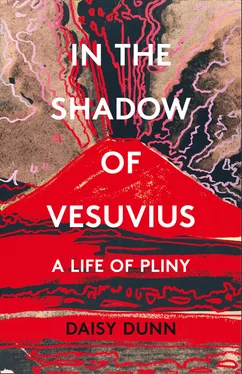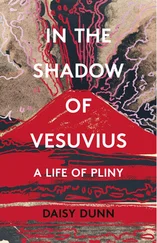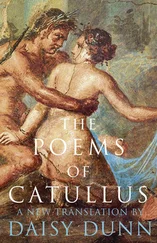1 ...6 7 8 10 11 12 ...17 The lives of Pliny and Tacitus frequently crossed. After he lost his father as a boy, Pliny was appointed a mentor, Corellius Rufus – a senator he ‘always referred everything to’ – and a legal guardian, Verginius Rufus. When Verginius passed away many years later, at the age of eighty-three, it was Tacitus who delivered his funeral oration. Pliny was still grieving when he went to hear it. ‘I think of Verginius,’ he confessed, ‘I hear him and talk to him and I hold him.’ He had known Verginius almost his whole life. His native Comum bordered Verginius’ Mediolanum (Milan), and their families owned adjoining property. 3A successful military man, Verginius had thrice been consul and might even have been emperor, had he heeded popular pleas to accept the role at the end of Nero’s reign. To Pliny he had been less a hero than a guiding light, showing him ‘the affection of a father’ and helping him as he embarked upon his career before resuming an honourable retirement on the coast of Etruria in Italy. ‘He read the poems which were written about him,’ recalled Pliny, ‘he read histories, and was part of his own posterity.’ 4Such scrolls, however, could be heavy, especially for an elderly man. It had been Verginius’ misfortune to drop a scroll on a polished floor, slip, and fracture his hip while attempting to retrieve it. The injury weakened him and he died.
Pliny’s grief was still raw ten years later when he visited Verginius’ former home and discovered that his tomb had not been finished, the man in charge of completing it too idle to have troubled himself over such a humble monument. ‘A mixture of anger and misery come over me,’ wrote Pliny, ‘that his ashes lie neglected without name or epitaph, although his glorious memory still wanders the world.’ 5Tacitus’ oration, sadly now lost, had done much to perpetuate Verginius’ achievements. It was so exemplary and well pitched that Pliny had anticipated accurately that his prayers for Verginius to remain ‘in the memories of men and in conversation’ would be granted. No one could replace Verginius, but in honouring his accomplishments as beautifully as he did, Tacitus became a model for Pliny in his own right.
One day, about thirty years after the eruption of Vesuvius, Pliny took the bold step of writing a letter to Tacitus expressing his desire to be featured in his work. His books will be ‘immortal’, Pliny predicted, ‘this is why (I’ll freely admit it) I am so keen to be inserted into them’. 6By the very next line he had launched into a detailed report of his prosecution of a Roman general for corruption. Tacitus was generous towards Pliny but craved something more profound from him. The historian was anxious to ‘hand down to posterity a faithful account’ of the eruption that had killed Pliny’s uncle. 7Buoyed by the idea that the death of the elder Pliny (not to mention his own survival) might achieve ‘immortal glory’, Pliny cast his mind back to his youth. In the first of two letters to Tacitus he described the course of the eruption before concluding on a cliffhanger: ‘My mother and I, meanwhile, were at Misenum – but that is of no historical consequence and you only wanted to know about my uncle’s death.’ It had the desired effect, and Tacitus now politely requested from Pliny an account of his own experience of Vesuvius. Pliny was only too happy to oblige: ‘You will read these parts without intending to write about them,’ he prevaricated in a further letter, ‘for they’re not remotely worthy of history; indeed, if they strike you as unworthy even of a letter, then impute it to the fact that you requested them.’ 8
This was the first and last time Pliny wrote of his mother in his letters, the earliest of which date to almost twenty years after the disaster, by which time she had presumably died. Conscious of how much time had passed, Pliny vowed in his accounts to draw on what he had witnessed himself and what he had heard immediately after the eruption, ‘when the truth is most remembered’. 9The sole eyewitness reports of the disaster to survive antiquity, Pliny’s letters have long been admired for their detail. The passages in which he described what he had experienced for himself are particularly valuable, his account of the stages, range, and appearance of the eruption broadly consistent with the archaeological evidence. 10The picture he paints of a rising ash column followed by prolonged pumice fall is in fact so well observed that volcanologists now classify such eruptions as ‘Plinian’. It is more difficult to substantiate what Pliny described of his uncle’s bravery, but then, whatever he wrote was always going to be open to doubt. As Umberto Eco asked in 1990: ‘One wonders whether Pliny would have preferred a Reader accepting his glorious product (monument to the Elder) or a Reader realising his glorifying production (monument to the Younger)?’ 11
Readers have, for the most part, accepted Pliny’s account of the eruption as both a remarkable tribute to the dead and a stirring enticement to adventure and risk. In the seventeenth century, the scientist and statesman Francis Bacon demonstrated just how readily Pliny the Elder’s example could be revived in the modern world. 12Bacon had held high office as Lord Chancellor and Privy Councillor under King James I and was the author of a work of natural history of his own, the Sylva Sylvarum. Although scholars had by now begun to discredit many of the so-called facts of the elder Pliny’s ancient encyclopaedia, Bacon was fascinated by its author and his fate and, in 1626, determined to present himself as his successor for his inquisitiveness.
Bacon was travelling north through London towards Highgate on a snowy day when the thought occurred to him that snow, like salt, might provide an effective means of slowing the decay of flesh. As his coach rattled slowly on, he surveyed the whitening roads and conceived a plan for testing his theory. After gathering what snow he could, he stopped at ‘a poore woman’s howse at the bottome of Highgate hill’ and presented her with a hen to disembowel (where he acquired the bird he did not say). 13The poor woman did as she was told, and Bacon proceeded to stuff the carcass with the snow. Unfortunately, soon after conducting the experiment, he became unwell. When he started vomiting he was unsure ‘whether it were the stone, or some surfeit, or cold, or indeed a touch of them all three’. 14He only knew he was too unwell to make it home. He therefore travelled the short distance to the house of his friend, the Earl of Arundel. Although the earl was not home, the housekeeper was ‘very careful and diligent about [him]’ and installed him in a guest bed with a warming pan. Bacon, however, quickly deteriorated. The bed had not been slept in for over a year and was damp, apparently leaving him with a graver chill than the one he had come in with. ‘In 2 or 3 daes,’ wrote John Aubrey, ‘he dyed of suffocation.’ 15
‘Suffocation’ was more enterprising a death than pneumonia or opium-poisoning, now considered the likelier causes of Bacon’s demise. 16It evoked most readily Pliny the Elder, being suffocated by the volcanic ash which Pliny had so memorably compared to snow. Scholars have studied closely the letter Bacon wrote on his deathbed in Highgate, likening himself in his quest to experiment with ‘the conservation and induration of bodies’ to Pliny the Elder, ‘who lost his life by trying an experiment about the burning of the mountain Vesuvius’. 17The elder Pliny had died after launching a mission to rescue people from the eruption, but that mission, as Bacon recalled, had originated as a quest to observe the phenomenon at close quarters. The parallel between preserving flesh through snow and rescuing flesh from fire was not lost on Francis Bacon, who concluded that there were less honourable ways of losing one’s life than by experimenting with methods for preserving it.
Читать дальше












